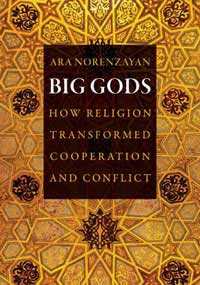 192 pages
192 pages7 CE credits
Course Enrollment
$190.00
Add to Cart
All exams are taken online. The exam for this course will be available in "My Courses" immediately upon enrollment. Note the book is not included.
The book is available for purchase from Amazon.
As an Amazon Associate we receive a rebate from qualifying purchases.
BIG GODS
How Religion transformed Cooperation and Conflict
Ara NorenzayanPrinceton University Press, 2015
DESCRIPTION
How did human societies scale up from tight-knit groups of hunter-gatherers to the large, anonymous, cooperative societies of today--even though anonymity is the enemy of cooperation? How did organized religions with "Big Gods"--the great monotheistic and polytheistic faiths--spread to colonize most minds in the world? In Big Gods, Ara Norenzayan makes the surprising argument that these fundamental puzzles about the origins of civilization answer each other.
Sincere faith in watchful Big Gods unleashed unprecedented cooperation within ever-expanding groups, yet at the same time it introduced a new source of potential conflict between competing groups. And in some parts of the world, societies with atheist majorities--some of the most cooperative and prosperous in the world--have climbed religion's ladder, and then kicked it away.
Big Gods answers fundamental questions about the origins and spread of world religions and helps us understand the rise of cooperative societies without belief in gods.
The reader will be able to:
• Examine how religion binds complex societies together and enables strangers to live cooperatively within them
• Explain the evidence that shows religions that have omniscient "Big Gods" who monitor and punish adherents for moral transgressions gave rise to large-scale societies of strangers out of small groups of related hunter-gatherers
• List and evaluate some reasons that religions with Big Gods are successful because they generate a sense of being watched and regulated, require extravagant displays of commitment that weed out religious impostors, and encourage solidarity and trust
• Elaborate on the author's theory that secular societies are really an outgrowth of prosocial religions
AUTHOR
Ara Norenzayan is professor of psychology at the University of British Columbia, and a co-director of UBC's Centre for Human Evolution, Cognition, and Culture. His research focuses on explaining religious beliefs and behaviors, their evolutionary origins, psychological impact, and culturally diverse manifestations.
EDITORIAL REVIEWS"Ranging across quantitative studies, historical cross-cultural examples, theological texts, and the practices of believers, Norenzayan convincingly argues that religions with Big Gods are successful because they generate a sense of being watched and regulated, require extravagant displays of commitment that weed out religious impostors, and encourage solidarity and trust."
--Publishers Weekly
"I found this book insightful, well-written, and to the point."
--Tyler Cowen, Marginal Revolution
"The book is a breakthrough, and will undoubtedly influence scientific perspectives on religion and secularism. . . . Without a doubt, Big Gods is a seminal and outstanding book, rocketing the psychological and evolutionary understanding of faith and secularization to new heights and new questions. I strongly recommend it to anyone interested in human evolution, psychology, and the scientific study of religion."
--Michael Blume, Evolution: This View of Life
"Once in a while, a whole field of research is pushed forward by a seminal work. Ara Norenzayan's Big Gods: How Religion Transformed Cooperation and Conflict is one of those rare books bound to becoming a classic for a generation of colleagues and students."
--Michael Blume, SciLogs
"This is an impressive work; it demonstrates how and why the Big Gods are still with us, and watching."
--Reference & Research Book News
"I recommend it to readers interested in the relationships between religions, the non-religious, and nation states. It should be required reading for psychologists and sociologists."
--John Harney, Magonia
"[T]his book is great value for the money: it provides energy, intriguing ideas and a joyous display of a fine mind, one that swoops and soars and frequently stops to preen, like some brightly coloured bird in an Edenic rainforest."
--Donald Harman Akenson, Literary Review of Canada
"Norenzayan weaves in one convincing scientific study after another, leaving me (as a study junkie) highlighting about every page. . . . His thesis is fascinating and well worth a read (or two). Norenzayan is not prescribing a way to end religion or to suggest that one form of thinking over another is better, but to get at the underlying factors that bring a society from big gods to secularity. I'm sure any deeply held convictions about the nature of religion and disbelief will be challenged tremendously by Big Gods, and as any analytical thinker would probably say, why shouldn't they?"
--Brandon G. Withrow, Discarded Image
"Ara Norenzayan's study Big Gods is an interesting study worthy to read."
--Kristof K.P. Vanhoutte, Metapsychology
"Norenzayan analyzes religion primarily as a mechanism for enforcing social cooperation, a problem for which the evolution of increasingly more powerful gods provides a solution in increasingly large and complex societies. . . . With consistently clear organization and thorough documentation, this book combines explanations for cognitive belief in supernatural entities with social explanations of religion's function, advancing readers' understanding of how the former serves the latter."
--Choice
"Norenzayan's book provides the best collection and dissemination of research regarding religion as a cultural adaptation for prosociality and cooperation among groups. It sets forth an important agenda for research among psychologists, religious scholars and historians."
--James A. Van Slyke, Philosophy, Theology, and the Sciences"
ISHK CE at Home
1702-L Meridian Ave., #266
San Jose, CA 95125-5586
This website uses cookies to ensure you get the best experience on our website. Learn more
